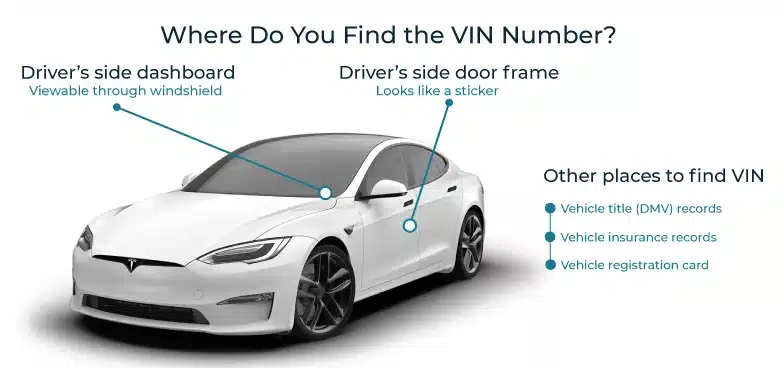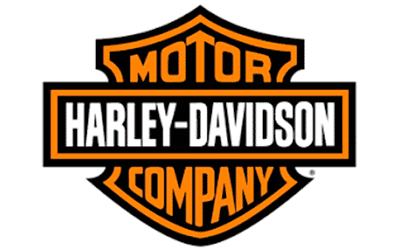
Harley-Davidson Recall Check
A Harley-Davidson Recall Check is a service that scans a Harley-Davidson motorcycle’s history to identify any outstanding recalls or defects. Detailed Vehicle History offers this service to help customers ensure that their Harley-Davidson is safe and reliable on the road, minimizing the risk of accidents or safety issues.
What is a Harley-Davidson Recall?
A recall is a formal. “We found a safety problem. Come in and we’ll fix it for free.” It’s triggered by Harley-Davidson or the National Highway Traffic Safety Administration (NHTSA) when a defect could increase crash or injury risk. Dealers handle the remedy at no cost, even if your warranty is long gone.
You can look up your bike recall history by VIN on the Harley-Davidson Recall Check with VIN lookup tools provided by the Detailed Vehicle History, and book a quick repair with a dealer.
Why You Should Check the Harley-Davidson Recall History?
Because safety beats guesswork. Every time. A recall check tells you if there’s an open campaign, what part’s involved, what could happen if ignored, and the exact free fix.
Below are some extra reasons why you should check the recall:
Avoid Unsafe Harley-Davidson
Harley-Davidson recalls happen when a motorcycle doesn’t meet safety standards or has defects that could cause harm. From small defects to major safety risks, acting on a Harley-Davidson recall quickly prevents accidents, keeps you safe, and guarantees free repairs.
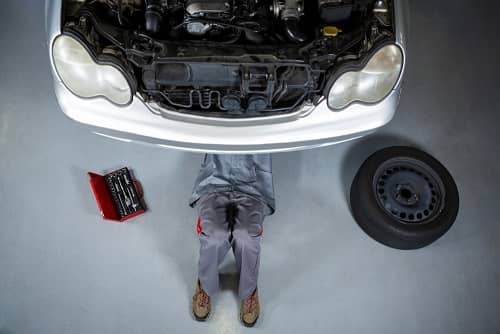
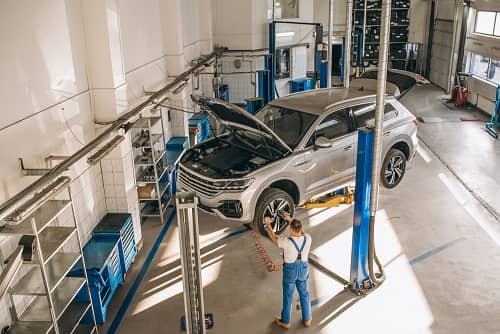
Compliance
Checking a Harley-Davidson’s recall history is essential for safety and compliance. Manufacturers must fix defects for free, so staying proactive helps you avoid legal liability, protect resale value, and prevent insurance complications while keeping you and your passengers safe.
Check Common Safety-Related Issues
Checking your Harley-Davidson recall history is essential for uncovering safety issues like loss of control, sudden power loss, and more. Hidden defects may not show immediately but can lead to serious danger if ignored. A Harley-Davidson recall check keeps you safe, compliant, and confident every time you drive.

How to Run Harley-Davidson Recalls?
Discovering your Harley-Davidson recall report is just a minute away! Follow these easy steps to get the information you need quickly and effortlessly:

Locate Your Harley-Davidson VIN
You'll need your Vehicle Identification Number (VIN) handy. It’s on the steering neck, registration, or insurance docs. Our lookup service works on any type of Harley-Davidson, classic or current.


Fill in the Form
Start your Harley-Davidson recall check now by entering your VIN in the form above. No VIN available can route you to the right record, and we’ll generate your recall report instantly.


Receive Your Harley-Davidson Recall Report
Wait for a few moments for the Harley-Davidson recalls report to be generated. Once it's finished, you can get the report on the recalls. Schedule the fix. Authorized dealers handle recall work at no cost.
What is on the Harley-Davidson Recall Check?
In the Detailed Vehicle History, a Harley-Davidson recall check shows detailed information about safety recalls affecting your vehicle. Each record outlines when the recall was announced, which component is impacted, and what action you should take.
Read further to see the detailed breakdown:
- Date of recalls: Indicates when Harley-Davidson and NHTSA issued the recall.
- Affected Component: Each report will specify which Harley-Davidson component is affected, detailing the defect and outlining the repair process required to fix it.
- Consequences: Here, you’ll find the potential risks associated with the defect, such as how it may impact your Harley-Davidson’s performance or safety.
- Next step for the affected Harley-Davidson: Confirm if your Harley-Davidson is listed under the recall and schedule repairs. With a complete Vehicle Report, you’ll also see past recalls and repair status.
A Harley-Davidson vehicle history report also includes loan & lien records, title check records, accident & damage records, stolen records, and more. Review the records below:
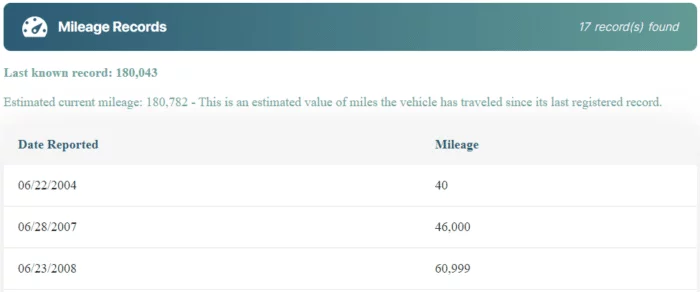
Loan & Lien Records
Ensure the title will transfer cleanly for your motorcycle. Discover active liens early so closings don’t stall at the last minute.
Title Check Records
Thinking about a used Harley-Davidson? Our VIN check flags salvage, rebuilt, fire, flood, and other branded titles so you don’t inherit someone else’s headache.
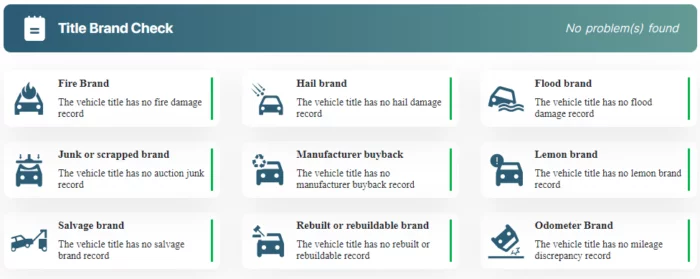

Accident & Damage Records
From minor drops to major hits, check your Harley-Davidson’s accident history and damage levels. Better to know now than feel it at highway speed.
Stolen Records
Don’t buy trouble. See if a Harley-Davidson was ever reported stolen and whether it was recovered. So your dream bike doesn’t become a legal mess.
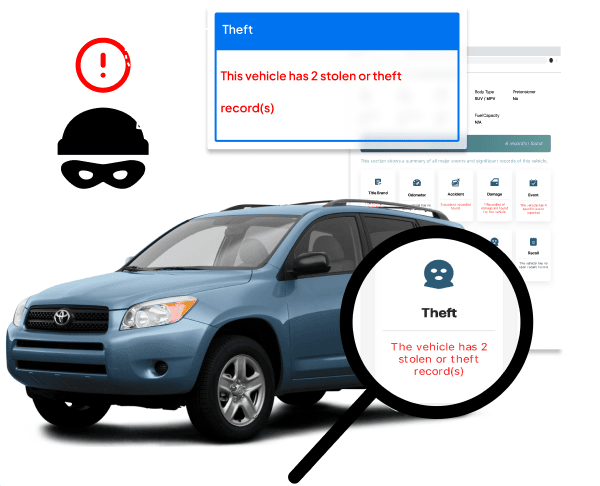
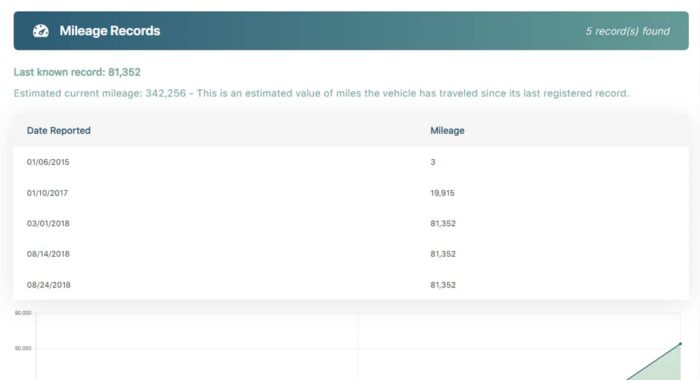
Odometer Readings
Chasing low miles? Confirm the real story. Our report lines up your Harley’s odometer history so tampering and “too good” deals stand out.
Ownership Records
Weekend cruiser, demo bike, rental, or fleet? See how your Harley was used, how many owners it’s had, where it lived, and for how long.
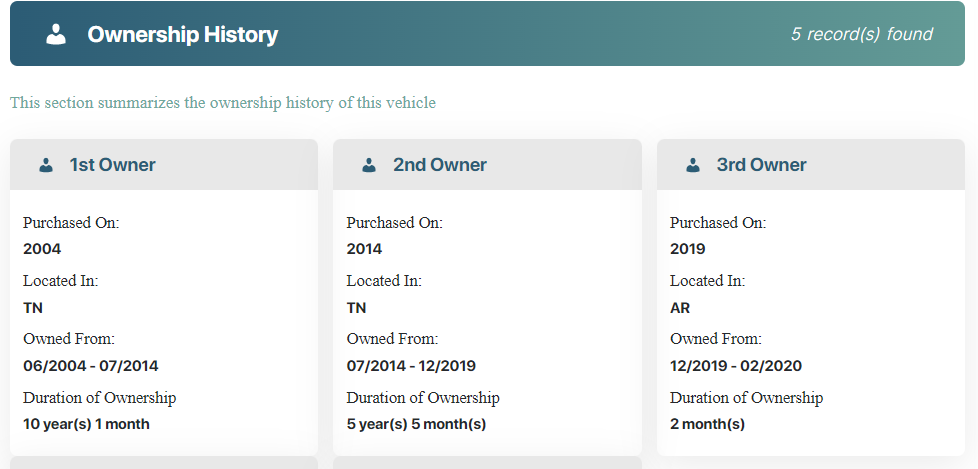
Common Issues Leading to Harley-Davidson Recall
In recent years, Harley-Davidson has faced multiple recall situations affecting various
motorcycle models, primarily due to safety concerns that could pose risks of serious
injury or death.
Below are some of the causes behind the Harley-Davidson recall notices.
Loss Of Control
Rear Shock Pre-Load Adjuster Tab Fractures
A Harley-Davidson recall comes down to structure. In a few models, the upper triple clamp can crack under hard loads, which can make steering unstable and cause a loss of control.
Softail bikes from 2018 to 2024, with coverage expanded in 2025, faced a weak rear shock preload adjuster mount. When that tab breaks, the adjuster can rub the rear tire, damage it, and lead to a rapid air loss. Affecting more than 82,000 motorcycles.
Dealers fix this with a stronger bracket and updated hardware at no cost. This action appears in NHTSA recall 25V375, with earlier coverage under 23V591. Affected owners were notified in mid-June 2025.
Upper Triple-Clamp Cracking
Harley-Davidson is recalling certain Sportster S (RH1250S) bikes after recent filings found the upper triple clamp can crack under stress, risking a sudden loss of steering. The action covers model years 2021–2025, formalized in September 2025 under NHTSA 25V590.
Dealers will replace the upper triple clamp free of charge, with owner letters scheduled around September 29, 2025. If you’re seeing this and you ride a Sportster S, run a VIN check today and get it handled.
Sudden Power Loss: Electrical Short/Drive Cut
Voltage-Regulator Output Wire Chafing
Some 2024 Touring and CVO Touring bikes have an electrical weak spot. A red wire from the voltage regulator can rub against the engine, wear through its coating, and short out. When that happens, the bike can suddenly lose power and all electrics, which is scary in traffic.
Dealers inspect the wiring, repair or replace the harness, and add a small strap to hold it in place. The fix is free under NHTSA recall 24V672.
Braking Degraded Or Lost
Brake-Fluid Deposit/Corrosion Sticking Abs Valves
Riders reported brakes that felt heavy and slow to release. That led to major recalls in 2018 and 2019 for corrosion-related brake drag. ABS motorcycles from 2008 to 2011 were especially vulnerable when moisture-contaminated DOT 4 fluid stuck to the valves.
Dealers handle the fix at no charge with a complete brake-system flush and fresh fluid. Recorded as campaign 0171 and NHTSA 18V076000.
Other Notable Issues
Large-Scale Clutch/Related Component Defects
In October 2018, a major Harley-Davidson recall (NHTSA 18V734000) hit 2017–2018 Touring, CVO Touring, Trike, and select Softail models. The hydraulic clutch’s secondary actuator could leak internally, letting air in and preventing the clutch from disengaging.
As a result, the bike can lurch or stay in gear, raising crash risk. Dealers replace the actuator piston assembly free (Recall 0173). Earlier clutch campaigns in 2013–2016 show this wasn’t a one-off.
Understanding the Harley-Davidson Recall Process
The NHTSA begins the recall process by investigating reported issues. If a defect is found, the manufacturer must issue a recall. See the steps of their process below
Report the Problem
Noticed a recurring issue on your Harley-Davidson? Share it with NHTSA. Your entry adds to a national database and helps identify defects that may lead to an investigation.
When many riders report the same problem, it flags a safety risk and can start an investigation.
Investigation
Once a complaint is submitted, the NHTSA follows a multi-step process to determine whether a recall is necessary.
- Screening: Complaints from vehicle owners are examined for credibility and evidence to decide if further investigation is justified
- Analysis: Defect petitions are reviewed in detail. If denied, the decision and reasoning are publicly posted in the Federal Register.
- Investigate the Issues: When Harley-Davidson’s safety concerns are confirmed, NHTSA launches a formal investigation, ending in either no defect or a recall.
- Recall Management: NHTSA ensures owners are notified and monitors repair completion rates.
Recalls
A safety recall means the maker must tell owners about a risk and fix it. Recalls happen when a bike or part is unsafe or fails to meet rules. Most are voluntary, and the maker must repair, replace, refund, or buy back the affected motorcycle.
How Harley-Davidson Vehicle Recalls Are Handled?
When a safety issue occurs in a Harley-Davidson, three key groups are involved in the recall process: the manufacturer/ automaker, NHTSA, and you, as the vehicle owner. They work together to detect defects, notify drivers, and ensure repairs are completed to keep vehicles safe.
Automaker Role
A Harley-Davidson recall starts with the company spotting a safety problem, filing with NHTSA, notifying owners within the required window, and delivering a no-cost repair through dealers. If the risk is high, notices may urge riders not to ride until fixed.
Recent examples show the rhythm: Aug 2023 fastener issues on many Softails; Sept 2024 wiring chafing on 2024 Tourers; June 2025 rear shock adjuster tab failures on 2018–2024 Softails. All the recalls triggered fast communication and free dealer remedies, with reporting back to NHTSA. It’s about finding the issue, telling riders, and closing the loop.
NHTSA’s Role
NHTSA’s job is to protect people on the road. It reviews complaints, runs defect investigations, and can push or order a recall when needed.
In a Harley-Davidson recall, NHTSA makes sure owners are notified, repairs cost nothing, and the remedy truly solves the problem. It follows the numbers, posts updates, and keeps a VIN lookup so riders can act fast. That oversight turns warnings into real fixes.
Your Role as the Vehicle Owner
Your role is simple and strong. Check your VIN for any Harley-Davidson recall, read the notice, and book the free repair with an authorized dealer.
If the letter says do not ride, park the bike. Bring it in, keep all paperwork, and ask about reimbursement if you already paid for the same repair.
After service, confirm the recall is closed. If problems remain, file a complaint with NHTSA and follow up with your dealer.
Get Harley-Davidson Window Sticker by VIN
Get the Harley-Davidson Window Sticker by VIN. See the original build in one place: model and trim, factory options, paint and finish, accessories, safety gear, warranty notes, and original MSRP. Match seller claims, confirm rare packages, and spot missing features before you pay. Pair it with your recall check for a fuller story and stronger negotiating power.
Upgrade now and ride in with confidence, not guesswork.
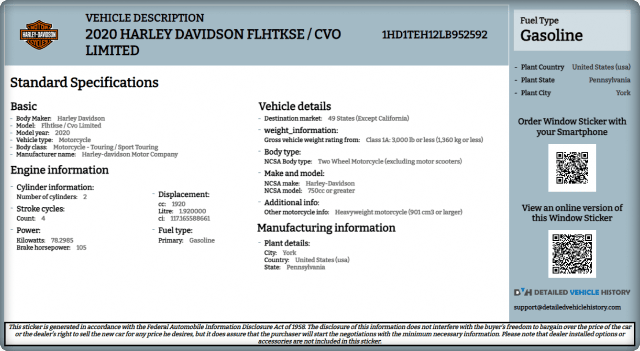
Why Use Detailed Vehicle History to Check Harley-Davidson Recall?
Why choose Detailed Vehicle History for your Harley-Davidson recall check? Because your bike deserves more than a yes or no.
Enter your VIN to see open and past recalls with dates, parts, and next steps, plus loan & lien records, title check records, accident & damage records, stolen records, and more. One clean report to verify claims, spot red flags, and ride away confident.
Recall Check For Others Manufacturers
FAQ about Harley-Davidson Recalls Check
Are Harley-Davidson recall repairs really free?
Yes. Safety-recall remedies are free at authorized dealers, regardless of warranty status. That’s federal law, and NHTSA audits compliance.
Which Harley models are affected right now?
Campaigns change over time. As of September 2025, recent examples include:
- Softail models (2018–2024/25) for a rear shock adjuster tab,
- 2024 Touring/CVO Touring for a regulator wire,
- ABS 2008–2011 brake-fluid contamination, and
- Sportster S (2025) triple clamp concerns.
Always confirm your recall status.
What happens if I ignore a recall?
Risk goes up. For example, the braking can fade, the power can be cut, or a tire can be damaged. You could also dent resale value and face disclosure headaches when selling.
Will Harley reimburse me if I have already paid for the repair?
Often, yes. If the repair matches the recall defect and meets the program rules. Recent Softail communications reference reimbursement language for eligible owners. Keep your invoices and contact Harley or your dealer.
How long does a Harley recall repair take?
Many fixes are quick (inspection/routing/flush). Some require parts ordering and a return visit. You’ll see timing details in the notice or VIN results page.
Does a Harley recall hurt resale value?
An unfixed recall can. A fixed recall (documented) often reassures buyers and dealers. Save your service record.
Is it safe to ride a Harley while I wait for the recall to be fixed?
Depends on the defect. Some issues are do-not-ride until repaired; others allow limited use. Read the notice carefully and follow the guidance. When in doubt, park it and call the dealer.

